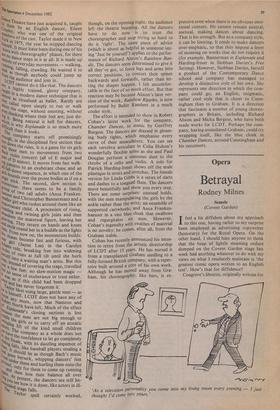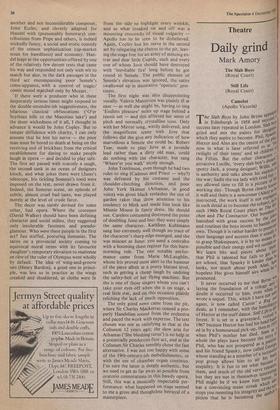Opera
Betrayal
Rodney Milnes
Semele (Covent Garden)
Ifeel a bit diffident about my approach 1 to this one, having rather to my surprise been employed as advertising copywriter (honorary) for the Royal Opera. On the other hand, I should hate anyone to think that the heap of lightly steaming ordure dumped on the Covent Garden stage last week had anything whatever to do with my views on what I resolutely maintain is 'the greatest comic opera written to an English text'. How's that for diffidence?
Congreve's libretto, originally written for
'As a television personality you come into my living room every evening — I just thought I'd come into yours.'
another and not inconsiderable composer, John Eccles, and cleverly adapted for Handel with (presumably honorary) con- tributions from Pope and others, is indeed wickedly funny, a social and erotic comedy of the utmost sophistication (up-market noun for bawdiness) and economy. Han- del leapt at the opportunities offered by one of the relatively few decent texts that came his way and responded not only with wit to match but also, in the dark passages in the third act encompassing poor Semele's come-uppance, with a control of tragic/ comic mood miatched only by Mozart.
If there were a producer who in these desperately serious times might respond to the double-entendre-ish suggestiveness; the hilarious classical obfuscations ('O'er Scythian hills to the Maeotian lake') and the sheer wickedness of it all, I thought in advance it would be John Copley. But to temper diffidence with charity, I can only assume that he lost his nerve — the poor man must be bored to death at being on the receiving end of brickbats from the critical establishment for daring to make people laugh in opera — and decided to play safe. The first act passed with scarcely a laugh, the second sank in an ocean of designers kitsch, and what jokes there were (Juno's telescope, Iris tickling Somnus's toes) were imposed on the text, never drawn from it. Indeed, the Somnus scene, an episode of subtle, almost cruel bad taste, was played merely at the level of crude farce.
The decor was surely devised for some other, bad opera. Where the costumes (David Walker) should have been defining character and social milieu, they suggested only intolerable fussiness and pseudo- glamour. Who were these people in the first act? Just stuffed, posturing dummies. The satire on a provincial society coming to equivocal moral terms with its favourite daughter's temporary elevation to maitresse en titre of the ruler of Olympus went wholly by default. The idea of wing-and-groove sets (Henry Bardon), a good one in princi- ple, was less so in practice as the wings creaked and shuddered, as cloths were lit
from the side to highlight every wrinkle, and as what creaked on and off was a mounting crescendo of visual vulgarity — Apollo has to be seen to be disbelieved. Again, Copley lost his nerve in the second act by relegating the chorus to the pit, leav- ing the stage free for an army of mincing ex- tras and dear little Cupids, each and every one of whom Jove should have destroyed with 'inevitable fire' long before he got round to Semele. The public element of Semele's elevation was ignored, the satire swallowed up in decorative 'operatic' pret- tiness.
The first night was also disappointing vocally. Valerie Masterson was plainly ill at ease — as well she might be, having to sing 'Endless pleasure' miles up stage behind a tennis net — and this affected her sense of pitch and normally crystalline tone. Only with her Mirror song, wittily delivered, and the magnificent scene with Jove that follows did she give any indication of how marvellous a Semele she could be. Robert Tear, made to play Jove as a juvenile lead rather than a dirty old man, could do nothing with the character, but sang `Where'er you walk' nicely enough.
John Tomlinson, even though he had two roles to sing (Cadmus and Priest — why?) was defeated by his costume and the shoulder-clutching direction, and poor John York Skinner (Athamas, in good voice) was given black eyelashes the size of garden rakes that drew attention to his tendency to blink and made him look like Minnie Mouse in fancy dress. He should sue. Careless costuming destroyed the point of doubling Juno and [no: they were simply the same character. Kathleen Kuhlmann sang Ino extremely well though no trace of the character's sharp edge emerged, and she was miscast as Juno: you need a contralto with a booming chest register for this barn- storming role. The one notable perfor- mance came from Marie McLaughlin, whose Iris proved most alert to the humour of the piece albeit at a pretty blatant level, such as getting a cheap laugh by undoing the safety-belt of her flying machine. But she is one of those singers whom you can't take your eyes off when she is on stage, a real little star, and on this occasion plainly relishing the lack of much opposition.
The only good news came from the pit, where Sir Charles Mackerras coaxed a pro- perly Handelian sound from the orchestra and paced the work with expertise. The text chosen was not as satisfying as that at the Coliseum 12 years ago; the slow aria for Athamas (`She blushing turns') is no help in a potentially ponderous first act, and at the Coliseum Sir Charles sensibly chose the fast alternative. I was not too happy with some of the 19th-century-ish embellishments, or with the use of chamber organ continuo. I'm sure the latter is deeply authentic, but we need to get as far away as possible from oratorio connotations in this bawdy opera. Still, this was a musically respectable per- formance: what happened on stage seemed to me a gross and thoughtless betrayal of a masterpiece.











































 Previous page
Previous page